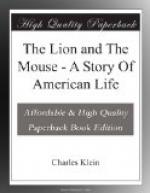They were life-long friends, having become acquainted nearly thirty years ago at the law school, at the time when both were young men about to enter on a public career. Stott, who was Rossmore’s junior, had begun as a lawyer in New York and soon acquired a reputation in criminal practice. He afterwards became assistant district attorney and later, when a vacancy occurred in the city magistrature, he was successful in securing the appointment. On the bench he again met his old friend Rossmore and the two men once more became closely intimate. The regular court hours, however, soon palled on a man of Judge Stott’s nervous temperament and it was not long before he retired to take up once more his criminal practice. He was still a young man, not yet fifty, and full of vigor and fight. He had a blunt manner but his heart was in the right place, and he had a record as clean as his close shaven face. He was a hard worker, a brilliant speaker and one of the cleverest cross-examiners at the bar. This was the man to whom Judge Rossmore naturally turned for legal assistance.
Stott was out West when he first heard of the proceedings against his old friend, and this indignity put upon the only really honest man in public life whom he knew, so incensed him that he was already hurrying back to his aid when the summons reached him.
Meantime, a fresh and more serious calamity had overwhelmed Judge Rossmore. Everything seemed to combine to break the spirit of this man who had dared defy the power of organized capital. Hardly had the news of the Congressional inquiry been made public, than the financial world was startled by an extraordinary slump in Wall Street. There was nothing in the news of the day to justify a decline, but prices fell and fell. The bears had it all their own way, the big interests hammered stocks all along the line,




